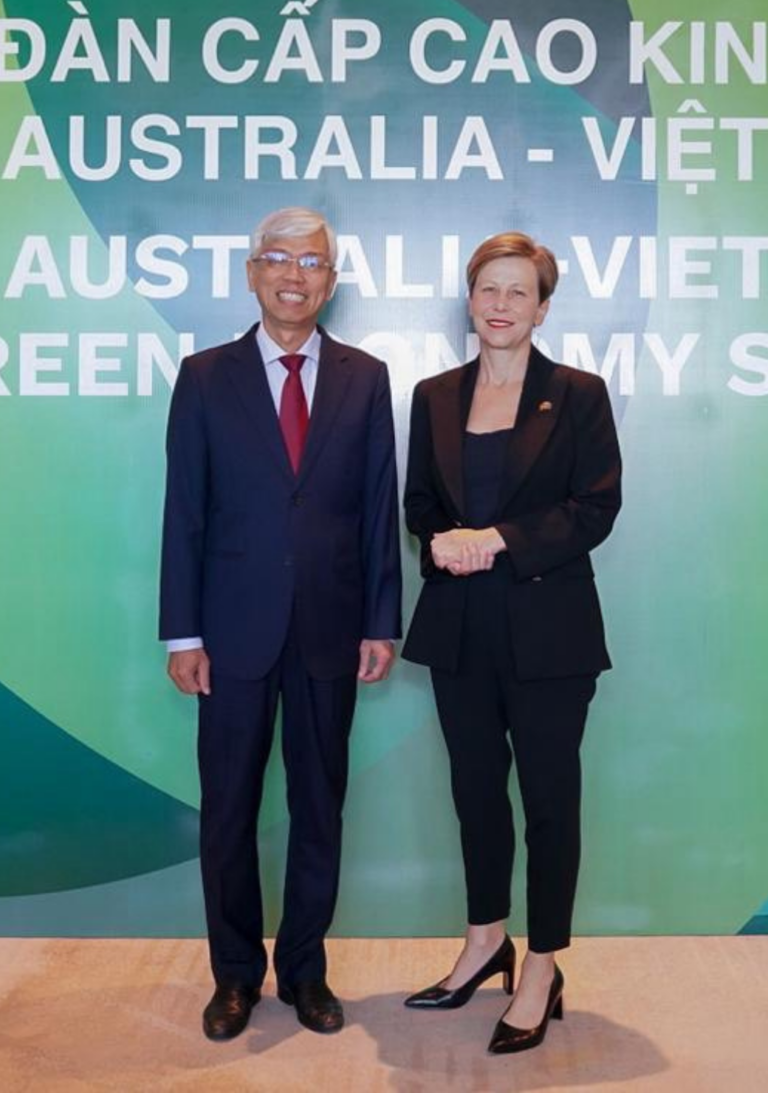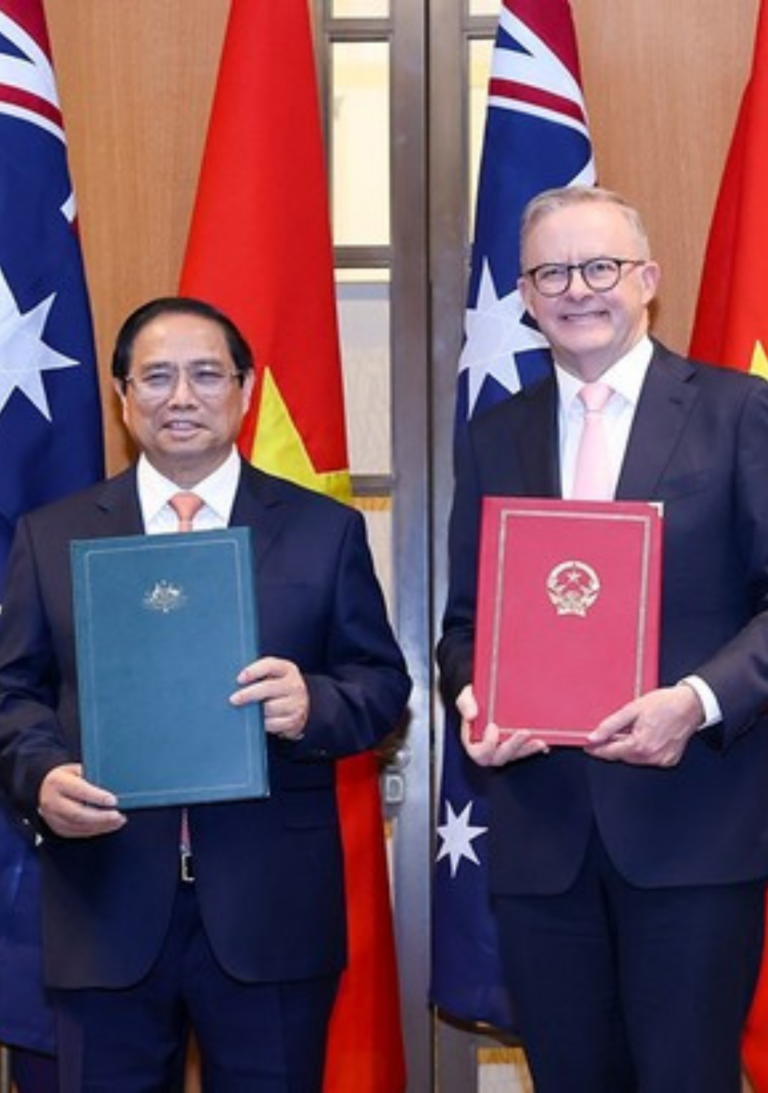An excerpt from 'Policing in a Changing Vietnam: Towards a Global Account of Policing'
Melissa Jardine, PhD is an AVPI Visiting Fellow. Her ground-breaking new book on policing in Vietnam is the result of over 25 years of engagement with Vietnam and over a decade of collaboration between Australian institutions and Vietnam’s Ministry of Public Security who supported the research.
The following is an excerpt from the opening chapter, titled ‘Policing, Place and the Production of Policing Knowledge’. Dr Jardine’s book is available for purchase online from the publisher, Routledge, and various outlets.
In the July summer heat, young officers in their green police uniforms pace around the Trường Sa archipelago (Spratly Islands), then the Hoàng Sa coral islands and reefs (Paracel Islands). The soles of police-issue black shoes tread on an area of concrete called the National Sovereignty Zone, painted an eye-catching blue to depict Biển Đông (the East Sea/South China Sea) as part of a miniaturised installation at the People’s Police Academy (PPA) in Hanoi. Raised, dark red areas bulge to shoe-height, symbolising the lands, islands and rocky outcrops that Vietnam claims as its own. Glass-like boxes sit adjacent to each of the offshore territories. Inside one box is a grey moon-like object which exudes a rough but also strangely smooth exterior, unevenly perforated by the millions of years of history that has washed over it: the plaque reads ‘Rock from Trường Sa Islands’. A few feet away, a container of course golden sand, also protected by glassy walls, is labelled ‘Sand from Hoàng Sa Islands’. The National Sovereignty Zone was installed on the Academy grounds in 2011 and sits adjacent to a large statue of former President Hồ Chí Minh. It serves as a daily reminder to budding police officers that territorial integrity, in a hotly contested maritime region, is a key part of their future mandate (reconstructed from fieldnotes).
Like the rock and sand from the Trường Sa and Hoàng Sa islands, the nature of policing and police cultures that emerge in particular places are shaped by multiple forces and dynamics. The physical attributes of places, such as being mountainous, an island or landlocked, as well as their interaction with the climate, are important not only because local people adapt, modify and respond to them but also because they shape available natural resources, opportunities for development and economic returns and consequently possibilities for territorial cooperation or conflict. The imperialism of the 19th century saw the systematic colonisation and repression of local and indigenous populations for resource extraction by Western powers, especially across the Global South. In Vietnam, territorial conflict and colonisation also preceded the 19th century, and its history includes prolonged periods of political instability and confrontation with imperialism, civil wars and in its battles for national independence against Chinese, French, Japanese and American occupations until as recently as the 1970s. Presently, Vietnam is an important and emerging strategic player in Asia-Pacific geopolitics and among the fastest growing economies in Asia. The state, led by the Vietnamese Communist Party (VCP), has a stake in disputed territories in the East Sea which is currently a fragile area of military and diplomatic contest. Amid increasing attention on security in the Asia region, what do we know about the nature of policing arrangements that have emerged from this unique context?
This is a study of policing in Vietnam. It examines Vietnam’s public police or those who most resemble the uniformed police in other jurisdictions, at least according to our modern understanding of police. The above vignette describing the National Sovereignty Zone on the grounds of the police academy alongside the first president of the one-party state illustrates the intersection of unique features that underpin Vietnamese policing. To explore the nature of policing and police culture in Vietnam, this study adopted an ethnographic approach to examine the country’s unique history—particularly the influences of Confucianism, colonisation, communism and capitalism—through investigating relationships police have with the political system, broad societal culture, legal frameworks, the community and gender as a social institution.
Aims of the Study and Organisation of The Book
This book aims to explore variations in the structural relations which give rise to police organisations and cultures outside the Global North or Western contexts upon which much of the foundational policing literature has been based, using Vietnam as a case study. It does not aim to provide an abstract general theory but rather an account of policing that considers the dynamics which shape policing in all its variations and nuances. The purpose is not to dismiss the conceptual orthodoxy of policing research. Given that the field has been underestimated in terms of its influence on police occupational culture, this study aims to illustrate that some assumptions about policing do not necessarily hold for a globally inclusive, comprehensive account of policing.
Chapters 2 and 3 provide background information regarding Vietnam’s unique history and the emergence of policing to draw attention to the structural environment within which contemporary police operate; specifically, Chapter 2, ‘Conflict, Continuity and Change: Shaping Vietnam and Contemporary Policing’, provides an overview of key aspects of Vietnamese history, including territorial disputes, invasions and the reunification of North and South Vietnam. A summary is also given on Vietnam’s transition to a market economy, which transformed the country’s legal institutions, including the role of the police and the way Vietnamese cultural norms mediate police practices around social control and responses to crime. Chapter 3, ‘The Emergence of Modern Policing in Vietnam’, highlights the historical and cultural context of policing. Beginning with an account of the role of police in the fight for independence from foreign powers, this chapter describes the explicit links between police and the political system with excerpts from the Constitution, relevant legislation and codes of ethics. Discussion is also presented on the structure of the PPF, rank hierarchy and recruitment processes and the connection between police education and academia. This chapter concludes by highlighting the way in which these structural dimensions shape the field for policing in Vietnam.
Chapters 4–6 present findings drawn from ethnographic fieldwork interwoven with historical information and other more recent documentary sources. Chapter 4, ‘Edification, Socialisation and Constructing Police Culture’, explores ways students and officers experience the police organisation and navigate careers. This chapter begins by introducing the importance of edification in broader Vietnamese society and the associated norms of tertiary education and aspirations for police. In addition, the importance of the study of ‘morality’ is explored which officers are encouraged to draw on to make judgements about their conduct and that of others. This chapter also discusses the way the police institution invokes ‘culture’ as a positive and useful construct which actively shapes police attitudes and socialises them into the occupation, highlighting a departure from the negative perceptions associated with police culture in the Global North literature.
Chapter 5, ‘Bamboo, Boundaries and Benevolence: Police Culture, Norms and Practices in Transition’, examines ways police relate to the community and understand their role as police officers, including their role as ‘educators’. The importance of being ‘flexible’ and using discretion are identified as key tools in Vietnamese policing which contributes to maintaining a harmonious environment. It reveals a diversity of views among police on their role in a rapidly changing society. Chapter 6, ‘Matriarchy, Mobilisation and Modern Women in Vietnamese Policing’, looks at the multiple and often conflicting representations of women in history, folklore and pop culture. Expectations of women in this culture prioritise motherhood and marriage as social accomplishments. These family obligations were described by both men and women as reasons why women were less suited for a policing career, although there were exceptions. This chapter highlights that women in Vietnam have diverse aspirations which are nonetheless constrained by social expectations.
The final chapter, ‘Towards a Global Account of Policing’, highlights how assumptions based on existing police scholarship do not necessarily apply to understanding policing in Vietnam. This chapter describes the importance of a theoretical framework that can advance our understanding of the multiple intersections and relational dynamics of policing in a particular place, and how these influence the extent to which change occurs in aspects of policing. This is particularly important for understanding how police may respond to both unexpected and planned changes or interventions in the field of policing which has relevance for reform efforts.
This book will show that Anglo-American/Northern assumptions about and claims to universality of some core characteristics of police culture and police work must be qualified by evidence of variation and fluidity revealed in studies from the Global South. It argues there is room for expanding our understanding of policing using a reflexive approach to examine broader structural variants which occur outside the Global North. Indeed, there is much diversity across the Global South and within the Asia region. The contribution of this research is not to present a North–South binary but to highlight that the field of policing can be very different from that described in the foundational policing research by Northern scholars. It is not to say traditional research on policing does not offer useful explanations to understand police better but, rather, that there are more perspectives from which we can learn.
Reviews
The construction of a Southern perspective of policing is a work in progress that is both ambitious and daunting. In this remarkable book, Melissa Jardine has taken us further than most contemporary researchers into this uncharted territory. Overcoming language, cultural, political and other major barriers to researching police culture in a foreign country, Dr Jardine mobilises her professional knowledge, academic rigour, empathetic attitudes and personal determination to bring out this ground-breaking research that is both highly readable and deeply challenging.
Janet Chan, Emeritus Professor, UNSW Faculty of Law and Justice, Australia
The minute I told my colleague, a Vietnam scholar, about this manuscript, he immediately said he must have a copy, or else… This manuscript will be an important addition to the literature of Vietnam studies as it opens windows of light to illuminate on an aspect of Vietnamese society that few researchers have had opportunities enjoyed by Jardine. The police in Vietnam is so Janus-faced that it is possible to condemn and to commend them simultaneously. Law and order in Vietnam would probably have been much worse if not for their strong arms but strong arms are also throwing the police into moral disrepute. This speaks well indeed to the North-South differences. Understanding the revolutionary background and the actual state of governance of the armed forces in Vietnam brings readers a sense of sympathy for the Vietnamese police. I commend and recommend this work for both the serious academic as well as for the policy activist who wish to understand the difficulties the police in Vietnam face.
David Koh, VinUniversity, Vietnam
Through her captivating prose, Dr Melissa Jardine brings Vietnamese mythology and folklore to life to explore the consistencies, conflicts and contradictions women in modern Vietnam face – especially as they relate to women in policing. Reflections on her own experience as a police officer are also deeply moving and thought-provoking. I truly appreciate Dr Jardine for her extraordinary contribution to gender studies in Viet Nam.
Khuat Thu Hong, Institute for Social Development Studies, Vietnam
As the world is in turmoil and we are looking for new concepts of community safety and well-being, it is important to widen our perspective beyond the Global North. This in-depth study of police education, training and practices in Vietnam is proof of the importance of investigating alternative roles and concepts of policing in the Global South.
Auke van Dijk, Strategist with the Police of the Netherlands; board member of Global Law Enforcement and Public Health Association (GLEPHA).
Citation: Jardine, M. (2023). Policing in a Changing Vietnam: Towards a Global Account of Policing. Routledge.
Dr Melissa Jardine is an international policing advisor, living in Vietnam.
More information: www.melissajardine.com
Twitter: @majardine











